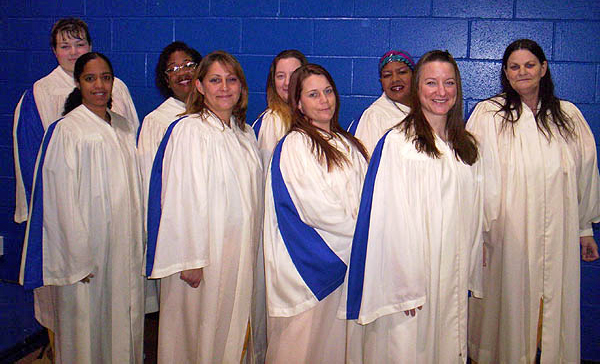The Chaplaincy Program at Hiland Mountain Correctional Center operates under the direct supervision of the DOC Statewide Chaplaincy Program. The goal of the Chaplaincy Program is to provide opportunities for prisoner reformation through religious programs, spiritual counseling, and pastoral care.


The Chaplaincy Program is affiliated with national and statewide religious programs and is in the process of networking with other state institutions with consistent, ongoing structured opportunities for religious practices, spiritual/moral development, and pastoral care.
The Hiland Mountain Chaplaincy staff consists of one chaplain (Chaplain Blodgett - left), three volunteer part-time female religious counselors, and two inmate assistants. The Chaplaincy is affiliated with the Kairos program and ongoing international prison programs. Inmates have access to religious books, religious videos, religious DVDs, religious music, greeting cards and religious schedules are posted throughout the institution.
The mental health program for open population inmates and graduates of the Mental Health Unit is called the HOPE Wing. The female inmates attend a program group in the morning, Monday - Friday focusing on criminal thinking errors, anger management, improving communication skills, developing appropriate coping skills, and a variety of other topics geared toward rehabilitation.
The inmates are required to maintain a 40 hour week program consisting of morning group, gym, work, and/or education. The HOPE Wing inmates join the Mental Health Unit inmates for gym group Monday - Friday as a way to assist with their integration into the HOPE Wing program and to present as role models.



The Library is well stocked with a variety of books and publications to support educational and recreational interest. A few educational computers are located in the library to assist with educational research and other learning programs.
The Mental Health Unit provides intensive 24 hour psychiatric services for the acutely suicidal and mentally ill female inmates. Mental health staff, nursing staff, and a psychiatrist provide treatment on a 24-hour seven day a week schedule.
The program involves a level system in which inmates earn points through a cognitive behavioral approach. They are able to work through the 4 levels to open population. Didactic, education groups take place throughout the seven-week schedule. Special goals are created to assist the inmate to work on identified problem areas as a part of their treatment plan
These treatment plans are reviewed and updated weekly by the treatment team. The treatment team is composed of the Director of Mental Health, the Nursing Supervisor, and available nursing staff, the treating Psychiatrist, the Director of the Mental Health Unit, a Mental Health Clinician, a Psychological Counselor, and an institutional Probation Officer. Coordination with available mental health providers is established to facilitate an appropriate release plan and to assist those inmates who are returning to the community who have mental health needs.

The non-profit organization ARTS ON THE EDGE was assembled in 2003 under the direction of Pati Crofut and Janice Weiss. The women at HMCC currently have participants in all three levels of music: Beginning, Intermediate and Advanced. The String Orchestra began with six participants and currently has eighteen (December 2006).
Fundraiser concerts are held at HMCC during the spring and winter/holidays. Concerts tickets are sold to support the general operating expenses of the String Orchestra for Incarcerated Women at HMCC. Tickets are advertised and sold at various music stores in Anchorage.
A valid Driver's License or photo identification is required for prison clearance prior to the concert. Contact Pati Crofut to receive more information about ARTS ON THE EDGE.
The Hiland Mountain Correctional Center offers women an opportunity to participate in an intensive, highly structured, six to twelve month, thirty-two bed Residential Substance Abuse Treatment program. Akeela, Inc., currently under contract to the Department, provides counseling and treatment supervision of the participants in partnership with facility staff assigned to this population, notably the RSAT Social Worker and a lead Probation Parole Officer II.
Potential candidates are carefully screened prior to admission, and must meet strict assessment criteria. The majority of women who qualify for the program have an extensive history of diagnosed substance abuse issues in addition to substance abuse related crimes, previous failed attempts at less intensive treatment programs, abusive lifestyles, poor impulse control, mental health issues, self-defeating behaviors, and a general lack of vocational, educational, and pro-social skills.

The HMCC RSAT program follows the Therapeutic Community, or "TC" treatment model which focuses on multi-dimensional change. The goal of the TC is to offer participants the opportunity to acquire the tools they need to embrace a new lifestyle, one that includes drug abstinence, develops employable skills, and fosters positive attitudes, values, and behaviors. All of which reflect honesty, responsibility, non-violence, and self-reliance. In short, "Right Living."
Right Living translates in part "into abiding by community rules, remaining drug free, meeting obligations, and participating in the daily regimen of groups, meetings, work, and educational function..." To accomplish this, the TC uses a combination of counseling, group therapy, and peer supervision and support to model and promote positive change within the "TC family" environment.

A small group of carefully selected inmates at Hiland Mountain Correctional Center have volunteered to obedience train abandoned dogs from the Mat-Su Animal Care Center as part of a pilot program.
Under an agreement between the state's correctional center for women and the Mat-Su animal shelter, the SPOT Program uses inmate volunteers to better prepare shelter dogs for adoption. A professional Kennel Owner and Rottweiler breeder, Cheri Hagen, donates her services to teach the inmate handlers how to train the dogs.
Dogs remain with inmate trainers for 6-10 weeks. "Each dog receives obedience training from a team of two inmates. In order to volunteer for the program, inmates must have no disciplinary write-ups, must have or be actively working for a GED, and must have six or more months left in their sentence, and they cannot have a history of child abuse," said Superintendent Dean Marshall.
The animal care center pre-screens the dogs for suitability and good health, and makes sure the dogs are current on all required vaccinations. In addition, the center provides kennels, food, leashes and feeding bowls.
For more information, please visit the Mat-Su Animal Shelter website
Hiland Mountain has a professional transitions coordinator on staff. Soon to be released Inmates are provided assistance with resumes, pre-release planning and information on a wide variety of community resources. Guest speakers and employment representatives provide up-to-date information on various issues facing the offender after release.
The most aggressive transition initiative took place in the form of a Women Conference. The conference took place inside the walls of Hiland.
Alaska's Supreme Court Chief Justice Dana Fabe, as part of the National Association of Women Judges, assembled an impressive group of community leaders, motivators, female judges (active and retired), physical fitness specialists, HR managers and a dress for success fashion show.
Seminars were conducted throughout the day by consultants and authorities on key transitional issues. The program was the pilot project for similar programs intended for use in other NAWJ jurisdictions, and it will be an annual event at Hiland Mountain.
